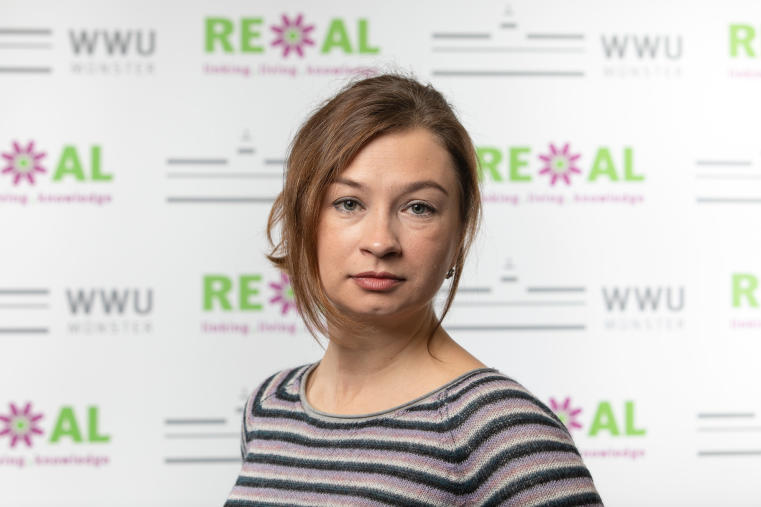Dr Anna Kornishchenko from the Ukraine

The most important I have gained new ideas for future projects and I plan to continue collaboration with my host institution.
Why did you decide to come to Muenster for your research?
I have been collaborating with prof. Wilde, Director of Institute of Materials Physics since 2011 when I came to Muenster for the first time as visiting researcher. Before coming to Muenster I knew anything about the city itself and University of Muenster. I have contacted prof. Wilde per e-mail writing that we have common scientific interests and that I am searching a host organization to participate in the program financed by Ukrainian Ministry of Science and Education and he has answered positively. After my first visit we have applied for collaborative project financed by DFG and this project get financing. I came to Muenster again in 2012 within the program financed by Ukrainian Ministry of Science and Education and in 2013 as a DAAD fellow. Then prof. Wilde has advised me to apply project for Alexander von Humboldt scholarship and from July 2017 till January 2019 I am Alexander von Humboldt fellow in Institute of Materials Physics. The choice of Muenster as a host organization was determined by previous productive collaboration between our scientific groups and the fact that I already familiar with experimental facilities available in the institute, and I knew well the scientific group.
What is your research about (in simple terms)?
My project is devoted to development of porous metals and metal oxide materials with different morphologies. It is known, that porous nanostructures depending on their morphology poses unique optical, magnetic, electrical, and other properties. In my research, first of all, I was concentrated on morphology dependent gas sensor properties. Development of gas sensors with high sensitivity and selectivity characteristics can impact development of effective environmental control systems. The second direction of my project was devoted to testing porous metal and metal oxide nanosystems as electrodes in Zn-air and Li-ion batteries. Electrochemical batteries are very promising for applications in electric vehicles, as elements of intelligent power supply systems, in renewables energy storage systems. At present the energy situation in Ukraine is rather complicated, therefore, development of alternative energy technologies is an important prerequisite for further social and economic development.
First of all, I am trying to advance this impact by developing materials that have high sensor selectivity and sensitivity for different toxic gases. There different methods of increasing sensor characteristics. In my research the sensor selectivity of the material is improved by tuning the morphology of the porous metal oxide (ZnO) layer and by developing nanosystems containing heterojunctions, for example p(NiO)–n(ZnO). Metal oxide are known as an alternative to graphite anode material for lithium-ion batteries. The first tests of porous ZnO layers have shown high capacity, close to theoretical value, but low cyclability I am trying to improve electrochemical properties of ZnO anode by decreasing size of porous layers structural elements and by usage of catalytic coatings of Ni, C, NiO deposited on the ZnO surface.
Has the research environment in Muenster affected your work? Would you recommend coming to Muenster to a colleague?
The research environment in Muenster has positively affected my work. I had access to modern equipment for nanostructures formation and characterization. Besides that the institute has good library and access to electronic databases. I worked in friendly, international environment. I have improved my academic and research skills. I have improved level of my German knowledge. The most important I have gained new ideas for future projects and I plan to continue collaboration with my host institution. I would recommend my colleagues to participate in exchange programs financed by DAAD or Alexander von Humboldt foundations and I would recommend Institute of Materials Physics as a host organization.
What would you advise other international researchers to do during their stay in Münster? Is there anything you do particularly like about Muenster?
I would recommend to participate actively in events organized by International Office of the University, it will allow to meet other international researches like you and to socialize in new environment. Also, I would recommend to take German course during the stay in Muenster even if you came for short time, because knowing the language will make live in Germany much easier. By doing research I would also recommend do not forget about other areas of live, like socializing, sports, hobbies, etc. I particularly like that the University of Muenster provides huge variety of sport classes for students and employees. For really small price you can keep practicing your favorite sport. Also. I really enjoyed to ride a bike in Muenster.
Further information
Programmseite ReAl - Research Alumni Strategie
